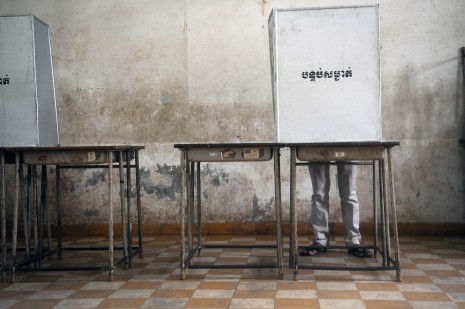The just-passed Pchum Ben holiday weekend was a rare opportunity for many migrant workers to return home to register to vote in the provinces, where their ballots will count for more than if they are cast in Phnom Penh.
—News Analysis—
Tweaks to electoral laws and years of failing to update constituencies to reflect population growth have gradually devalued voting in the capital. It’s reached the point that a vote in Phnom Penh could be worth as little as half a vote in a neighboring province by 2018 if people turn out in proportion to population projections.
Phnom Penh has long been the opposition’s key stronghold, with the CNRP grabbing seven National Assembly seats to the CPP’s five in 2013. But its strength there is a disadvantage thanks to electoral idiosyncrasies entrenched by new laws passed after the last election.
This election cycle, for the first time, migrant workers have been given the right to vote where they work instead of just in their home provinces, enfranchising many who would not have been able to travel for registrations and voting—but, at the same time, further skewing the disproportionality of Cambodian elections.
Because of lapses in redistributing National Assembly seats across provinces amid years of urban flight, the value of a vote varies wildly, and is lower in the capital than almost anywhere else.
The uneven nature of ballots undermines the fairness of Cambodia’s elections, said Koul Panha, executive director of the Committee for Free and Fair Elections.
“Whoever is in power controls this,” he said. “They know where their strongholds are, and can put more seats there.”
Under current law, votes in Phnom Penh will count toward electing 12 of 125 National Assembly members in 2018, or 9.6 percent. But Phnom Penh is projected to have 12.6 percent of Cambodia’s population by then, according to an estimate by Statistics Japan, which helped conduct the country’s last census.
By comparison, neighboring Prey Veng has 11 seats, representing 8.8 percent of National Assembly members, but only 6.2 percent of the population—meaning that a vote in Phnom Penh is projected to be worth just over half of a vote in Prey Veng. (The statistics used did not break down the voting-age population.) Both provinces voted for the CNRP in 2013. But any migrant workers who switch their voting location to Phnom Penh could see their votes count for less.
Mr. Panha said votes should either be added to the tally in home provinces regardless of where people register, or Cambodia’s electoral constituencies should be updated to reflect current population densities.
Cambodian law previously mandated the redistribution of seats during every five-year National Assembly term to reflect population changes—though in practice the government has failed to make any adjustments since 2003. The clause was removed during electoral reforms made last year in negotiations between the CPP and CNRP.
“They didn’t change it because this is a very, very political situation,” Mr. Panha said of seat distribution.
According to new electoral laws agreed upon by the two parties in March last year, there is no formula for determining the number of National Assembly seats to be selected by each province, he added.
“In the old law, it was clear that they should calculate the seats based on density of population…. Now they’ve deleted all this. They just list the number [of seats],” Mr. Panha said. “This is very dangerous: Whoever controls the national [governing] party can increase the seats according to their political benefit—the law isn’t clear about why you can increase or decrease.”
A simple majority in the National Assembly would let any future governments gerrymander constituencies for any reason, he said.
The new laws made just two changes to electoral constituencies, otherwise unchanged since 2003. It gave eight seats to a newly created CPP-supporting province, Tbong Khmum, by splitting the CNRP-voting Kompong Cham; and added two seats to Preah Sihanouk, which narrowly voted CPP in 2013.
Preap Kol, executive director of Transparency International Cambodia, which sends out hundreds of volunteers to monitor elections, said votes in Phnom Penh would be “wasted” as far as the CNRP was concerned.
“The rule to allow people to vote in the place where they live does help migrant workers. But politically speaking, the urban areas and the cities have been the stronghold of the CNRP. So for the CNRP, it will be a disadvantage,” Mr. Kol said.
“So the more people that register in urban areas, where the CNRP is already strong, the more votes go wasted for them.”
According to the population projections, the value of a vote in Phnom Penh for the National Assembly elections is estimated to be lower than all but three provinces, Oddar Meanchey, Ratanakkiri and Siem Reap.
Sok Eysan, a spokesman for the ruling CPP, said the number of seats allotted to each province could still be changed if they were too far out of line.
Once registrations were over, the National Election Committee could recommend dividing up the National Assembly’s 125 seats proportionally, and the government could then ask lawmakers to pass an amended electoral law, Mr. Eysan said.
“If necessary, the election law can be amended,” he said. “But I think that if there isn’t much change in the number, the seats will stay the same.”
(Additional reporting by Colin Meyn and Kuch Naren)




